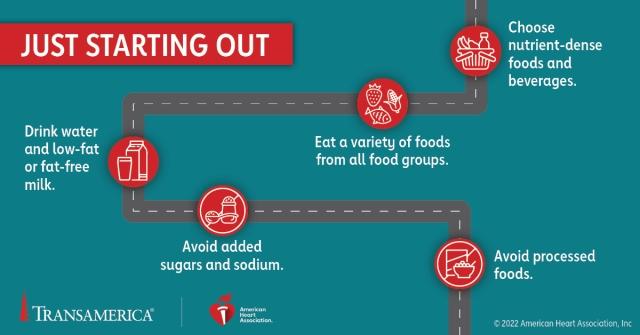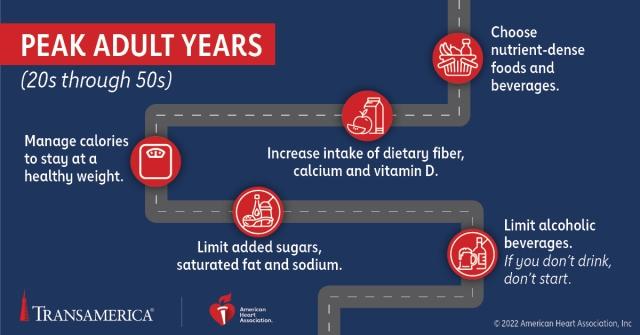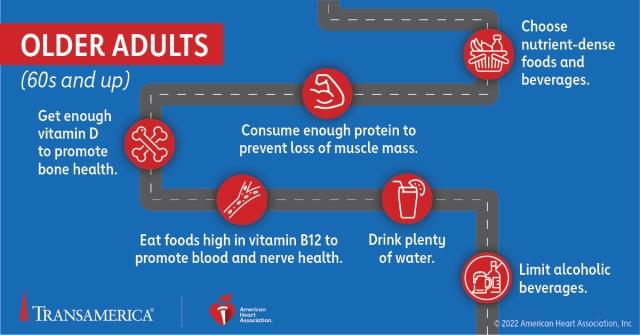Why It Matters:
- Food choices in all stages of life affect long-term health.
- Healthy eating can prevent health problems such as heart disease and help you avoid chronic conditions later in life.
- Every age group from infancy to elderly has specific needs for healthy eating.
Healthy eating is important at every age and affects your health for years to come. So make every bite count.
“A nutritious diet can help prevent heart disease and other health problems and can contribute to a longer and better quality of life,” said Penny Kris-Etherton, Ph.D., RD, the Evan Pugh University professor of nutritional sciences at Penn State University. “There are benefits at any stage in life,” she said.
Fruits, vegetables, whole grains, lean proteins, and low-fat dairy or a healthy dairy alternative are core elements of a healthy diet. Try to limit or avoid foods with added sugar and too much sodium and saturated fat.1 These general nutrition recommendations apply to everyone, but tips for all life stages will keep you on a healthy path.
Healthy eating can be achieved based on personal preferences, cultural traditions, and the household budget.2 Variety is the key when making a healthy eating plan for yourself or loved ones. Look for guidelines on the U.S. Department of Agriculture website at myplate.gov.
Just starting out
“Young children benefit from eating nutritious foods at an early age. It also helps when other family members are role models for healthy eating,” said Kris-Etherton, past chair of the American Heart Association’s Nutrition Committee and Council on Lifestyle and Cardiometabolic Health.
Taste preferences develop early, so stick with nutrient-dense foods. Avoid feeding infants and young children foods and beverages with added sugars and high sodium.3 With the exception of infants, children should drink water or low-fat or fat-free dairy milk, or alternatives such as fortified soy or lactose-free milk.4
Parents and caregivers should aim to serve children an assortment of foods, flavors, and textures. Even if a young child rejects a healthy item at first, that doesn’t mean they always will. It may take up to eight or 10 tries for a toddler to accept a new food.5 Continue to introduce green beans or broccoli, for example, perhaps alongside hummus for dipping. Offer the new healthy food along with the child’s favorites.
“You really want to try and promote healthy eating,” Kris-Etherton said. “Keep serving a healthy plate.”
“Fast foods and processed meals sold in boxes, cans, and bags that are loaded with sodium should be avoided,” Kris-Etherton said. She suggests cooking easy, inexpensive dishes, such as rice mixed with a can of lower-sodium beans and frozen mixed vegetables instead. Add a little bit of spice to perk up the flavor.
Serve children different types of proteins such as seafood, beans, lentils, nuts, eggs, lean meats, or poultry. As they get older, get kids involved with preparing meals by having them set the table, stir ingredients, or assemble salads.
Teens and young adults need to take an active role in choosing healthy foods on their own. Then those good eating habits can become a foundation for nutritious eating for decades.
Peak adult years
From your 20s into your 50s, life may become busy with work and family. So it’s easy to lose track of what you’re eating and drinking. In these peak adult years, focus on long-term health because your diet affects your future.
“Prevention is a better strategy than treating a costly chronic or life-threatening health problem later. Just like maintaining a home or car, taking care of your body makes it last longer,” Kris-Etherton said.
“Nutritious eating helps prevent high blood pressure and reduce LDL (bad) cholesterol, which, in turn, can prevent heart disease,” Kris-Etherton said. A healthy diet helps manage calories and maintain a healthy weight to avoid gradual weight gain over time.
Type 2 diabetes is a serious health problem for millions of Americans, but it can be prevented by eating healthy, reaching and maintaining a healthy body weight, and being physically active.6
Take a mindful approach to eating. When planning meals, consider the recommendations of the federal 2020 - 2025 Dietary Guidelines for Americans. Eat the essentials of a healthy diet, including fruits, vegetables, and a variety of lean and plant-based proteins. Consume enough foods rich in calcium and vitamin D, such as low-fat or fat-free dairy and salmon.
If you tend to snack while you’re on the go, take along plain popcorn, fresh fruit and vegetables, dried fruit, or whole-grain crackers. If you live alone, freeze leftovers in single servings for easy heat-and-eat meals.
“Be aware of food portions. Many restaurants go overboard with portion size, and sometimes this occurs when serving meals at home. Research has shown when people are served larger portions, they tend to eat more,”7 Kris-Etherton said.
Drinking alcohol is also something to watch. If you don’t drink, don’t start. If you drink alcohol, do so only in moderation. The American Heart Association recommends no more than an average of one to two drinks per day for men and one drink per day for women.2 Different types of beer, wine and liquor have different amounts of alcohol. But in general, a drink is one 12-ounce regular beer, five ounces of wine or one and a half ounces of 80-proof spirits, such as bourbon, vodka, or gin.8
Older adults
In your 60s and beyond, eat enough protein to maintain lean muscle mass, and make sure to get sufficient vitamin D for healthy bones. Focus on foods that contain the nutrients you need such as potassium, calcium, fiber, and vitamin B12.9Absorption of vitamin B12, which helps with blood and nerve health, decreases with age, and can be reduced when taking certain medicines. Vitamin B12 is found in fish, meat, poultry, eggs, milk, and other dairy products. Some other food products are fortified with vitamin B12.10 Eat a variety of healthy foods and learn how many daily calories are needed to help maintain energy balance.
Drink water frequently. It’s necessary for normal body functions. As people age, it’s easier to get dehydrated because they may lose some of their sense of thirst.
“Older people may also have difficulty chewing some raw vegetables and nuts. Look for ways to eat these nutritious foods by chopping up apples or almonds or eating softer fruits such as bananas,” Kris-Etherton suggested.
Chopping and slicing also may be difficult for some older people. If so, seek out frozen, canned (without added sugars and salt), or ready-to-eat varieties of fruits and vegetables.
Make meals satisfying and enjoyable by eating with others, when possible. Invite friends to get together for a casual meal or a potluck dinner. A community center or church may offer shared meals.
Personalizing a healthy eating plan
Healthy eating can fit in with family traditions and beliefs. You can experiment with new recipes to make nutritious eating interesting and appealing to personal tastes. And it can be done on a budget.
To save money, buy fruits and vegetables that are in season or on sale. Purchasing fresh fruits and vegetables that you clean and prepare are usually less expensive than those already washed, sliced, and packaged. Frozen fruits and vegetables are just as healthy and may be less expensive than fresh ones. When buying canned items, select fruits packed in 100% fruit juice with no added sugars, and vegetables labeled “low sodium” or “no salt added.”
When buying meat, consider purchasing larger value packs and freeze what you don’t need to use right away. Don’t forget other sources of affordable protein, including canned fish and eggs.
These reminders can help you maintain a nutritious diet regardless of your stage in life. It’s never too late — or too early — to start a healthy eating plan.
Things to Consider:
- Nutritious eating can incorporate cultural traditions, personal preferences, and the household budget.
- Choose a wide variety of foods from all food groups and be mindful of eating nutrient-dense foods to meet all of your nutrition needs.
- Pay attention to alcohol consumption and adhere to guidelines to only drink in moderation if you drink alcohol.
- Controlling food portions helps you manage calories and prevent weight gain over time.
1 “2020-2025 Dietary Guidelines,“ U.S. Department of Agriculture, 2020
2“5 Things Nutrition Experts Want You To Know About New Federal Dietary Guidelines,” American Heart Association, January 2021
3“My Plate – Infants,” U.S. Department of Agriculture, 2020
4 “My Plate – Kids,” U.S. Department of Agriculture, 2020
5“My Plate – Toddlers,” U.S. Department of Agriculture, 2020
6“Prevent Type 2 Diabetes,” Centers for Disease Control and Prevention, December 2021
7 “Understanding ‘Portion Distortion’ and Learning How to Eat Mindful Servings,” Healthline, January 2022
8 “What is a Standard Drink,” National Institute on Alcohol Abuse and Alcoholism, accessed February 2022
9“My Plate – Older Adults,” U.S. Department of Agriculture, 2020
10 “Vitamin B12,” National Institutes of Health, July 2021
This article was prepared by the American Heart Association (AHA). Transamerica is not affiliated with the AHA and does not control, guarantee, or endorse the information. This information does not constitute the practice of medical advice, diagnosis, or treatment. Always talk to your healthcare provider for diagnosis and treatment, including your specific medical needs. If you have or suspect that you have a medical problem or condition, please contact a qualified healthcare professional immediately. If you are in the United States and experiencing a medical emergency, call 911, or call for emergency medical help immediately.
Transamerica Resources, Inc. is an Aegon company and is affiliated with various companies which include, but are not limited to, insurance companies and broker dealers. Transamerica Resources, Inc. does not offer insurance products or securities. The information provided is for educational purposes only and should not be construed as insurance, securities, ERISA, tax, investment, legal, medical or financial advice or guidance. Please consult your personal independent professionals for answers to your specific questions.






